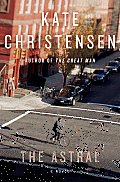
Last weekend at the Iowa Writers' Workshop's 75th reunion, I sat on a panel with two other writers,
Benjamin Hale and
Matthew Rohrer. The topic we had been asked to discuss was "How Does Humor Speak the Unspeakable?" Before the conversation devolved into banter about Hello Kitty ("Everything cute is also sad," said Matthew; we pondered this and found it true, but not the converse), we attempted, with commendable earnestness, to address the question.
On the plane the day before, I had serendipitously stumbled on an interview with the comic Louis C. K. in the in-flight magazine. Asked how comedy speaks the unspeakable, he said something like, "You remove all reason and logic from a situation, and then what's left is passion and confusion." This made me think of Lear's Fool, the only person in the play who can say unspeakable things to the king without being banished; he tells the truth by couching it in verse, riddles, and jokes: "He that has and a little tiny wit? / With a heigh-ho, the wind and the rain? / Must make content with his fortunes fit, / Though the rain it raineth every day" strikes me as a fine metaphor for being a comic writer.
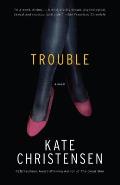 Ben's novel The Evolution of Bruno Littlemore tells the brutally funny, sad, dark story of a chimp who learns to speak and becomes human. Matthew's poetry is unpunctuated, startlingly funny in its sudden jumps from quotidian to philosophical and back again. Most of my own novels are narrated by articulate, educated losers/antiheroes whose lives are going off the rails in spite of themselves. Our work is very different, but we all play with the dual nature of humanity, the fact that we are simultaneously animal ? in Ben's novel, literally ? and divine. When reason and logic are suspended, our writing descends into the realm of passion and confusion, the dark world of the unspeakable. If we are indeed comic writers ? which we all wondered aloud about at the panel's outset ? the humor in our work, and in fact in all comic literature, comes in part from this electrical charge, this juxtaposition, the falling-away of the illusion that we have any sort of godlike control over ourselves or the world.
Ben's novel The Evolution of Bruno Littlemore tells the brutally funny, sad, dark story of a chimp who learns to speak and becomes human. Matthew's poetry is unpunctuated, startlingly funny in its sudden jumps from quotidian to philosophical and back again. Most of my own novels are narrated by articulate, educated losers/antiheroes whose lives are going off the rails in spite of themselves. Our work is very different, but we all play with the dual nature of humanity, the fact that we are simultaneously animal ? in Ben's novel, literally ? and divine. When reason and logic are suspended, our writing descends into the realm of passion and confusion, the dark world of the unspeakable. If we are indeed comic writers ? which we all wondered aloud about at the panel's outset ? the humor in our work, and in fact in all comic literature, comes in part from this electrical charge, this juxtaposition, the falling-away of the illusion that we have any sort of godlike control over ourselves or the world.
The qualities in the kind of novel I've always found most interesting and memorable are interpersonal drama, trouble, tension, mischief, and/or emotional duress. For me, the key word is "interpersonal." An overly contrived or clever or gimmicky plot can detract from what I find most important in a story: How are the people getting along? How do they feel about one another? What sorts of mistakes are they making, and what are the consequences?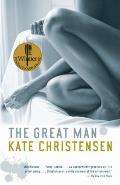
Marriage and sex, friendship, and social goings-on are my favorite novelistic subjects. Marriage is particularly high-stakes and intense ? no two marriages are exactly alike, and not even one marriage is the same thing from year to year. As a plot device, marriage is superficially limited but intrinsically riveting. It's a story with two basic possible endings: The couple either stays together, or they split up. The same way bystanders in real life find themselves invested in, judgmental of, and involved with the breakup of a couple they know well, readers tend to invest themselves in fictional characters' lawful unions and project their own hopes, beliefs, fears, and desires onto their travails.
I lived in north Brooklyn ? Williamsburg and Greenpoint ? for the better part of 20 years. For seven of these years, I lived around the corner from the legendary, sprawling Astral Apartments. The character and narrative voice of Harry Quirk sprang into my imagination straight from my ideas about the Astral (I've never set foot in the building) ? he's been kicked out of that big red ghetto-castle pile by his irrationally jealous wife Luz, a Mexican nurse.
Harry is a manifestation of Greenpoint, a neighborhood where it's simultaneously 1876, 1933, 1958, and 1974, and where even the present feels sepia and eternal. He looks like any one of the energetically shambling, slightly down-at-heels men of a certain age who walk the Greenpoint streets looking solitary and full of stories; during all the years I lived there, they sparked my imagination. Their lives seemed so different from mine. I would walk by such a man and wonder: What is his story? Where does he live? Where is he going?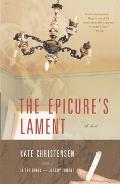
Harry finds himself, as the novel opens, 57 years old, suddenly without a wife or a home or a poetry career, just scrambling to get by from day to day. He's opted out, or maybe he's been pushed out, of his participation in the great New York dream. The Astral is, at its core, concerned with the necessary, rueful acceptance of your own limitations as you get older, the diminishment and rejiggering of identity to reflect reality after a certain point.
The entire tenor of the book is shaped around the image of paradise lost, and Adam alone, humbled, and brought low. Harry's need to understand the past is intense and urgent; he's a falsely-accused man hell-bent on proving his own innocence and discovering the actual perpetrator of the crime. The book was half inspired by Joyce Cary's The Horse's Mouth and half by the convention of detective noir in which the accused becomes the crime-solver by default, to clear his own name, and goes around interviewing anyone who can help him figure it out. Harry shambles around Greenpoint, hot on the trail of the cause of the death of love, inquiring and analyzing and picking up clues: Love is dead ? who killed it?
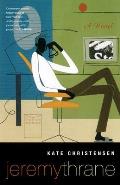 I had intended this novel to be a tragedy. But, as if I were one of my own narrators, it turned out that I had no control over my fate as a writer; this new novel is, like all of my novels, a (dark) comedy ? or maybe it's a comic noir. In any case, the tragic vision does not seem to be in my repertoire; much as I would like to categorize myself as a serious writer, I always seem to end up on the humor panels. The only thing to do would seem to be to accept my fate, just as my characters are forced to accept theirs.
I had intended this novel to be a tragedy. But, as if I were one of my own narrators, it turned out that I had no control over my fate as a writer; this new novel is, like all of my novels, a (dark) comedy ? or maybe it's a comic noir. In any case, the tragic vision does not seem to be in my repertoire; much as I would like to categorize myself as a serious writer, I always seem to end up on the humor panels. The only thing to do would seem to be to accept my fate, just as my characters are forced to accept theirs.
Why this story became comic rather than tragic has everything to do with how I see my own place in the world and how this sense of things permeates and informs every word I write.
With much less success than Cormac McCarthy, I tried to imitate Faulkner as a student at the Writers' Workshop in my 20s. I wrote turgid prose, breathlessly urgent with the tragic fates of my characters, my voice wobbling with earnest, imitative flat-footedness. I thought that was how you were supposed to write if you wanted to be Great, and I assumed you were supposed to want to be Great. There was a rape! A lesbian love scene with the word "plum" prominently featured! A sad little family in the Arizona desert! And other terrible, hilariously dramatic things. I wrote three chapters of the novel, turned it in as my MFA thesis, and abandoned it forever.
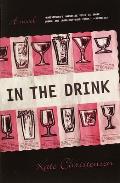 Five years later, after floundering painfully in a world that was not hailing me as a literary genius, or anything close to it, I exploded in a burst of rebellion against this earnest literary greatness I'd been trying with no luck to cultivate. I remembered how to write ? and remembered that as far as I can see, we are not demigods, we just sometimes think we are, and the resulting comeuppance can be very funny. I went right back to the way I'd started out writing as a kid ? visceral, playful, fun, subversive, with no thought of Greatness, no thought of anything but having a good time as I wrote, of exposing people, showing them as they are ? not as they ought to be or as I wished they were: Heroism and sentimentality went out the window, and I was left with my real voice. Claudia Steiner, who narrates my first published novel, In the Drink, is the exact same narrative soul as the narrator of my first finished novel ? also named Claudia ? a comic murder mystery I wrote when I was 13 to amuse a boy I had a crush on in Social Studies class.
Five years later, after floundering painfully in a world that was not hailing me as a literary genius, or anything close to it, I exploded in a burst of rebellion against this earnest literary greatness I'd been trying with no luck to cultivate. I remembered how to write ? and remembered that as far as I can see, we are not demigods, we just sometimes think we are, and the resulting comeuppance can be very funny. I went right back to the way I'd started out writing as a kid ? visceral, playful, fun, subversive, with no thought of Greatness, no thought of anything but having a good time as I wrote, of exposing people, showing them as they are ? not as they ought to be or as I wished they were: Heroism and sentimentality went out the window, and I was left with my real voice. Claudia Steiner, who narrates my first published novel, In the Drink, is the exact same narrative soul as the narrator of my first finished novel ? also named Claudia ? a comic murder mystery I wrote when I was 13 to amuse a boy I had a crush on in Social Studies class.
Comedies don't win Oscars, and they generally don't win Pulitzers either. Comic writers aren't taken nearly as seriously as tragic ones, but we have more fun, and that's all that matters, at least to me. I'll happily sit on the humor panel (or, as we called it, the "kids' table") for the rest of my life, cracking up when my fellow panelist points out that words with two Os look like boobies, and other pithy insights. Maybe I'm wrong, but Faulkner might have enjoyed sitting up there, too.